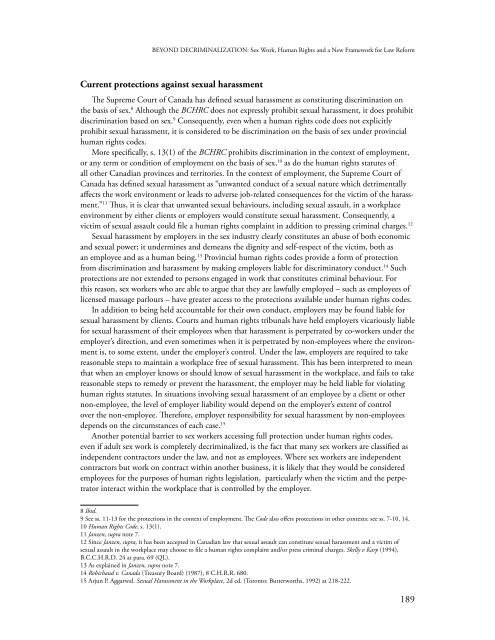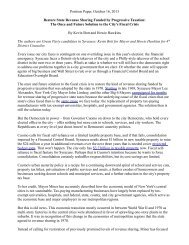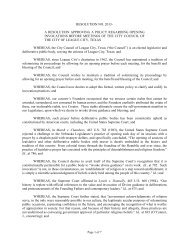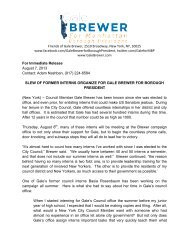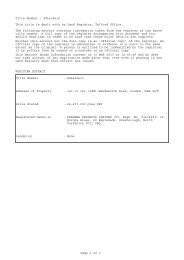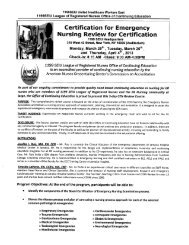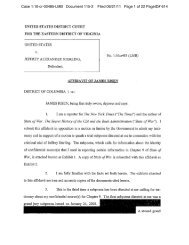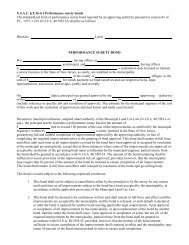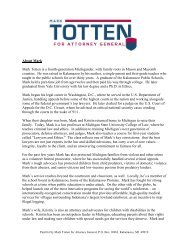Beyond Decriminalization: Sex-work, Human Rights and a New ...
Beyond Decriminalization: Sex-work, Human Rights and a New ...
Beyond Decriminalization: Sex-work, Human Rights and a New ...
- No tags were found...
You also want an ePaper? Increase the reach of your titles
YUMPU automatically turns print PDFs into web optimized ePapers that Google loves.
BEYOND DECRIMINALIZATION: <strong>Sex</strong> Work, <strong>Human</strong> <strong>Rights</strong> <strong>and</strong> a <strong>New</strong> Frame<strong>work</strong> for Law ReformCurrent protections against sexual harassmentThe Supreme Court of Canada has defined sexual harassment as constituting discrimination onthe basis of sex. Although the BCHRC does not expressly prohibit sexual harassment, it does prohibitdiscrimination based on sex. Consequently, even when a human rights code does not explicitlyprohibit sexual harassment, it is considered to be discrimination on the basis of sex under provincialhuman rights codes.More specifically, s. 13(1) of the BCHRC prohibits discrimination in the context of employment,or any term or condition of employment on the basis of sex, 10 as do the human rights statutes ofall other Canadian provinces <strong>and</strong> territories. In the context of employment, the Supreme Court ofCanada has defined sexual harassment as “unwanted conduct of a sexual nature which detrimentallyaffects the <strong>work</strong> environment or leads to adverse job-related consequences for the victim of the harassment.”11 Thus, it is clear that unwanted sexual behaviours, including sexual assault, in a <strong>work</strong>placeenvironment by either clients or employers would constitute sexual harassment. Consequently, avictim of sexual assault could file a human rights complaint in addition to pressing criminal charges. 12<strong>Sex</strong>ual harassment by employers in the sex industry clearly constitutes an abuse of both economic<strong>and</strong> sexual power; it undermines <strong>and</strong> demeans the dignity <strong>and</strong> self-respect of the victim, both asan employee <strong>and</strong> as a human being. 13 Provincial human rights codes provide a form of protectionfrom discrimination <strong>and</strong> harassment by making employers liable for discriminatory conduct. 14 Suchprotections are not extended to persons engaged in <strong>work</strong> that constitutes criminal behaviour. Forthis reason, sex <strong>work</strong>ers who are able to argue that they are lawfully employed – such as employees oflicensed massage parlours – have greater access to the protections available under human rights codes.In addition to being held accountable for their own conduct, employers may be found liable forsexual harassment by clients. Courts <strong>and</strong> human rights tribunals have held employers vicariously liablefor sexual harassment of their employees when that harassment is perpetrated by co-<strong>work</strong>ers under theemployer’s direction, <strong>and</strong> even sometimes when it is perpetrated by non-employees where the environmentis, to some extent, under the employer’s control. Under the law, employers are required to takereasonable steps to maintain a <strong>work</strong>place free of sexual harassment. This has been interpreted to meanthat when an employer knows or should know of sexual harassment in the <strong>work</strong>place, <strong>and</strong> fails to takereasonable steps to remedy or prevent the harassment, the employer may be held liable for violatinghuman rights statutes. In situations involving sexual harassment of an employee by a client or othernon-employee, the level of employer liability would depend on the employer’s extent of controlover the non-employee. Therefore, employer responsibility for sexual harassment by non-employeesdepends on the circumstances of each case. 15Another potential barrier to sex <strong>work</strong>ers accessing full protection under human rights codes,even if adult sex <strong>work</strong> is completely decriminalized, is the fact that many sex <strong>work</strong>ers are classified asindependent contractors under the law, <strong>and</strong> not as employees. Where sex <strong>work</strong>ers are independentcontractors but <strong>work</strong> on contract within another business, it is likely that they would be consideredemployees for the purposes of human rights legislation, particularly when the victim <strong>and</strong> the perpetratorinteract within the <strong>work</strong>place that is controlled by the employer. Ibid. See ss. 11-13 for the protections in the context of employment. The Code also offers protections in other contexts: see ss. 7-10, 14.10 <strong>Human</strong> <strong>Rights</strong> Code, s. 13(1).11 Janzen, supra note 7.12 Since Janzen, supra, it has been accepted in Canadian law that sexual assault can constitute sexual harassment <strong>and</strong> a victim ofsexual assault in the <strong>work</strong>place may choose to file a human rights complaint <strong>and</strong>/or press criminal charges. Skelly v Karp (1994),B.C.C.H.R.D. 24 at para. 69 (QL).13 As explained in Janzen, supra note 7.14 Robichaud v. Canada (Treasury Board) (1987), 8 C.H.R.R. 680.15 Arjun P. Aggarwal. <strong>Sex</strong>ual Harassment in the Workplace, 2d ed. (Toronto: Butterworths, 1992) at 218-222.189


